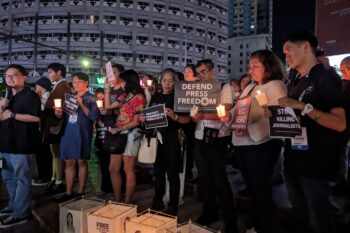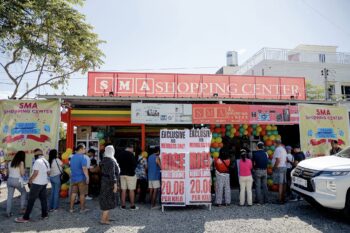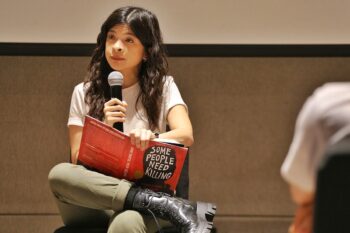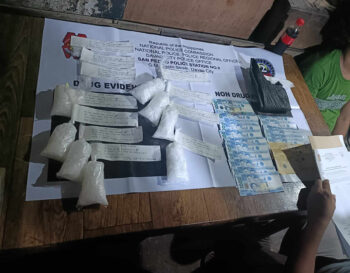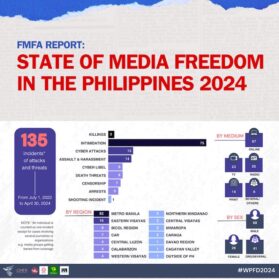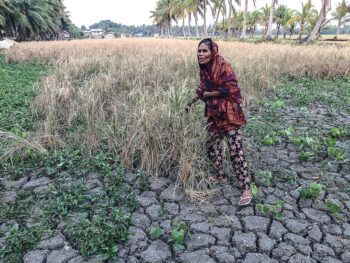 ZAMBOANGA CITY (MindaNews / 18 June) – This was another poignant week when we heard the news of their demise, one after the other: Dr. Bai Cabaybay Abubakar, President of Sharif Kabunsian College (SKC), and Dr. Ustadza Albaya Badrodin, retired Education Supervisor of Cotabato City Division. We are saddened by the news coming at a time when the BARMM is transitioning and the likes of them the ones needed in the education sector, and particularly, in the Madrasah education.
ZAMBOANGA CITY (MindaNews / 18 June) – This was another poignant week when we heard the news of their demise, one after the other: Dr. Bai Cabaybay Abubakar, President of Sharif Kabunsian College (SKC), and Dr. Ustadza Albaya Badrodin, retired Education Supervisor of Cotabato City Division. We are saddened by the news coming at a time when the BARMM is transitioning and the likes of them the ones needed in the education sector, and particularly, in the Madrasah education.
Dr. Abubakar was one of the advocates of the integrated madrasah program of the Department of Education (DepEd). Her SKC elementary department was among the early program implementers. She was very articulate, arguing with DepEd officials on how to simplify the recognition requirements and process, insisting on essentials, instead of coming up with a menu list. For her, the essentials are the curriculum and the teaching-learning interaction between teachers and learners.
She was as frank talking with Filipino officials as in facing education leaders overseas. I remember her articulating what had been accomplished in the Philippines in three years’ time and how this can still be improved before a group of education officials from Thailand, Indonesia, and the Australian Agency for International Development (AusAID).
She was an active participant in our overseas study tour, inquiring about curriculum implementation in Malaysia, the how’s of working with the government’s education department in Singapore and sustaining operations of Islamic schools in Australia. Even after the plenary, she would take time to confer with teachers, interact with students, and repeatedly ask education officials on how they are relating with private Islamic schools. She wanted to know more because she had early on realized the importance of a positive and symbiotic relationship between government, through the DepEd, and with the madrasah sector.
She is also among the few female administrators in our pilot madaris and she would be a model for them as she is for those managed by male administrators. I recall her first interaction with DepEd officials from Region XI. A Muslim supervisor was wondering why there is a need to organize an integrated madrasah. The supervisor added, is it not enough for Muslim learners to go to school on weekdays to learn secular skills and to go to weekend madrasah for their religious obligations? To this, she patiently explains the so-called “dichotomy” in Moro education and how integration can narrow this divide. I overheard them talking about school finances when at times, expenses are numerous and financial support is low. To this Dr. Cabaybay confides, then it is that time of the year when you dip into your own pocket to sustain the madrasah operation. Dr. Cabaybay was so convincing in her explanation, Davao City supervisor Rose Mapiguid went home determined, and persuaded her family in Banay-Banay, Davao Oriental, to organize one for their Kagan community. This integrated madrasah would be the first to be recognized by DepEd in Davao Region. When Rose Mapiguid passed away, Banaybanay Pilot Madrasah, Incorporated [1], was endowed by her family to the community. This school year, this madrasah is offering up to Level 7 or first-year high school.
Dr. Abubakar continues to talk and to advocate in any forum, sharing her experiences, personal and professional, that they as women can be leaders in their own right and that they can excel in the field of madrasah leadership. Leadership was never about sexual identity as it is about competence and commitment. Towards this end, she was joined by Dr. Ustadza Albaya Badrodin. Together, they were like the two sides of the same coin. While Dr. Abubakar flourished in the integrated madrasah setting, Ustadza Albaya would shine in the public school sector.
Ustadza Albaya’s getting into public school was a consequence of her empathy in reaching out to Muslim learners and teachers who are not going to the weekend madrasah. Thus, as these learners and teachers are progressing well in their secular education, she worries they are not heading the same way in their religious commitment. So when Muslim education was started in DepEd by 2005 under the leadership of Undersecretary Dr. Manaros Boransing, she was well-placed in the division office as Values Education Supervisor. She had prepared well for her vision of integrated education – a licensed teacher and a traditional ustadza. What a combination!
Many things she started and pioneered, including the now popular ‘musabaqah’ (academic competition, exhibition) for Islamic and Arabic subjects in DepEd and ‘muhadarah’ (lecture) in schools during Ramadhan. While her fellow Muslims in DepEd is slowing down during the fasting month, Ustadza Albaya would up her ante in the conduct of these activities.
We couldn’t hear her criticizing anyone even if they were not consistently following Islamic precepts. She would leave them to their own task. However, when they started inquiring about the consistency of their action with Islamic teachings, she would take pains in slowly preparing them through. With hikmah (wisdom), they would see her point and readily adopt her advice.
She would challenge people around her to think more and beyond their comfort zones. Gently reminding them that “time in power” or “time in public position” is not forever, therefore they have to seize the opportunity for benefits higher than immediate gains and selfish interests. So with her reminder of the power and benefits of “Fillah” (doing things for the love of God), people around her were all the more invigorated to work even after office hours, on weekends, and on holidays. In this respect, she led by example. On weekdays, she did her tasks and rounds as an education supervisor; and on holidays and weekends, she went around communities, near and far, to realize her tasks as a religious teacher and counselor. At one time, she would be in a hinterland community and at another in a community by the marshland.
When many were skeptical about madrasah integration, she was optimistic. As she is able to connect what we are doing with what the late Salamat Hashim taught them about Islamic education in the jungles of Mindanao.
She was one of those who pushed for the ALIVE program. Unknown to many, the first curriculum developed for DepEd by the ulama was focused on integrated madaris. It was her, then a full-fledged division supervisor, asking critical questions, such as, how can we provide access to Muslim learners in schools who are not attending madrasah on weekends? In the middle of the curriculum development process with SEAMEO INNOTECH, Usec Boransing had to organize a separate curriculum group for these Muslim learners in public schools.
She was with the ulama group in ARMM that developed the first standardized assessment for Arabic language and Islamic Studies competence, which became the Qualifying Exam (QE) for recruitment of ALIVE teachers nationwide. When overseas graduate ulama and members of this committee wanted to bring the QE to their Middle East university standard, she would immediately caution them, reminding them of their own proficiency when they were her madrasah students in Cotabato City. With patience and gentle persuasion, the QE standards would be a compromise between overseas and local standards, not too high for local graduates and not too low for overseas graduates.
She was a protector when people put their interest ahead of the program and Muslim learners resorted to threats and violence. When fear became unbearable, she would remind those who are about to be disheartened not to give up, “Allāh is our Protector. No one can harm those whom Allāh protects,” she said. She knew all too well how to soothe the heart and clear the mind.
Dr. Bai Cabaybay Abubakar and Dr. Ustadza Albaya Badrodin were the leading ladies of their time in a world dominated by men. They would be the leading ladies respected by men for their wit, competence, and compassion. They were lady leaders able to stand their ground among male leaders. They were not just leaders in madrasah education, they were also leading women in interreligious dialogue and in advancing peace and development and articulating the same through the lens of gender and Islam. They were the female voices of engagement and moderation in an environment of protracted conflict and insecurity.
INNĀ LILLĀHI WA INNĀ ILAYHI RĀJI’ŪN – From God we came and to Him we all return.
(MindaViews is the opinion section of MindaNews. Noor Saada is a Tausug of mixed ancestry – born in Jolo, Sulu, grew up in Tawi-tawi, studied in Zamboanga and worked in Davao, Makati and Cotabato. He is a development worker and peace advocate, former Assistant Regional Secretary of the Department of Education in the Autonomous Region in Muslim Mindanao, currently working as an independent consultant and is a member of an insider-mediation group that aims to promote intra-Moro dialogue.)

